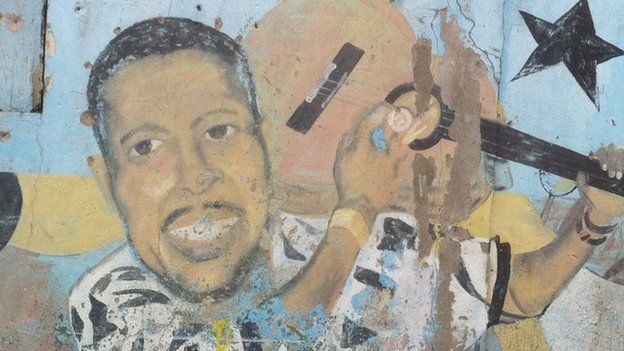Jamaica 'no safer' after capture of gang leader Coke
- Published

Nearly four years after the capture of notorious gang leader Christopher "Dudus" Coke in the Jamaican capital, Kingston, a commission of enquiry has been set up to look into the security operation which led to his arrest.
More than 70 people were killed and a limited state of emergency was imposed as police launched the five-week operation aimed at trapping the man who prosecutors said was so powerful that he enjoyed "virtual immunity from the reach of law enforcement".
His arrest was celebrated as a coup for the Jamaican security forces, but in his former stronghold in West Kingston, some residents say that their lives have not seen much improvement.
The main roads in Tivoli and Denham Town are close to the hustle and bustle of Coronation Market, the island's biggest, where people from all across Jamaica come to buy and sell produce.
But the side streets are bleak, almost post-apocalyptic.
I am walking alongside officers from the Mobile Reserve, Jamaica's elite police squad specialising in crime hotspots and policing gang-controlled areas.
Armed with high-powered pistols and assault rifles, they are constantly scanning the streets, houses and individuals they come across.
One has a slingshot which he uses to deal with stray dogs. But the officers say that the weapons carried by the criminals they encounter are much more high-tech than this particular bit of kit.
Crossfire
The patrol moves through the small inter-connected lanes that run like a grid through the area. A back-up police truck follows the officers through the streets.
The patrol stops and the officers search a group of young men, looking for illegal guns in a neighbourhood which resembles a small-scale war zone.
Street names here can be deceptive. Last month, 11-year-old Kerica Butler was caught up in a shoot-out between rival gunmen in Pink Lane.
She was lucky to survive - the bullet entered her jaw and lodged in her neck.
It is often the youngest who suffer most in this area. In 2013, a total of four children died and 11 more were injured in West Kingston.
Residents say the violence is out of control.
Gang war
"The shootings are almost daily; people have got used to the high level of criminality, it's almost like people are immune to it now. It has to stop," says the area's MP, Desmond McKenzie.
I speak to a man from the community as he observes the officers, who are preparing to do another sweep of the area.
As we stand by the street junction, he explains that the men who live on his side of the road are fighting those who live on the other.
"When he was here, things used to be better, people weren't dying in the area," Marlon, who does not want to give his surname, says referring to the arrest of Christopher "Dudus" Coke.
Coke, who is serving a 23-year prison sentence in the United States for drug and gun-trafficking, ran this part of the city and turned it into a state within a state.
Known as a "don", or criminal boss, Coke provided a safe haven for gang members from across the country. He also ensured no crime was committed without his say-so.
And in order to command the loyalty of local residents, he paid for the education of many children in the area.
His power lasted until 2010, when the security forces - after months of delay - moved against him on the orders of the government at the time.
Coke barricaded himself in his stronghold, and the operation to catch him soon turned deadly, leaving more than 70 people dead.
Deadly game
Since his arrest and subsequent extradition to the United States, Coke's relatives and his rivals have been jostling for control of his criminal empire.
Residents liken it to a deadly game of Monopoly, in which gang members from Regent Street are battling those from Bond Street.
The violence has left more than 120 people dead in the past year.
"Things have changed, there's no dominant control, people have lost their command so that's a big issue," the local police inspector says of the deadly power vacuum that opened up after Coke's arrest.
The police try to break up the gang culture by removing gang graffiti and painting over murals that glorify the exploits of imprisoned or dead former gang leaders.
But the violence continues unabated.
On Tulip Lane locals protest against the shooting by police of a local man.
"He had no gun," assures one of the protesters. "He was unarmed, he was innocent," agrees another.
Senior police officers say he was a member of the Scare Dem Gang. The gang's name is prominently tagged across a bridge over a nearby culvert.
But people within the community are now making a stand. On the walls of homes belonging to gang members, new graffiti has started to appear.
Instead of gang names or pictures of jailed criminals, the new graffiti calls for the violence to stop.
It may be a small move, but in a community where people are not only scared of the gangs, but also of the police and sometimes even of each other, it is a brave first step.
- Published8 June 2012
- Published8 June 2012
- Published1 September 2011
- Published1 September 2011